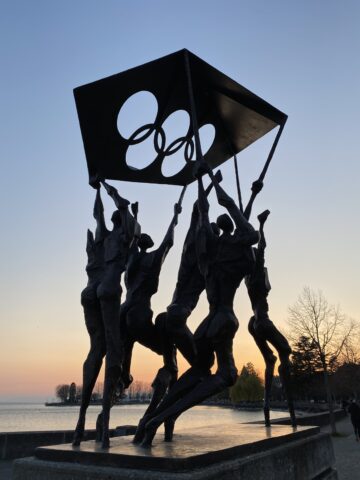Arguments disregarded by the Panel must have been “regularly” raised during the procedure
SFT Judgment 4A_318/2017 - Football Club A v. Player B - Erroneous judgment on Jurisdiction / violation of public policy (inadmissible); violation of the parties’ right to be heard (unfounded)
Football Club A. v. Player B. – The Issue
Before the CAS: contract of employment between a football club and a player – outstanding salaries
Before the SFT: Right to be heard: arguments disregarded by the Panel must have been “regularly” raised during the procedure; violation of public policy (pacta sunt servanda, dismissed)
The Swiss Federal Tribunal Proceedings – Appeal of Football Club A. against the CAS Award rendered on April 24, 2017
The case involved a contract of employment between professional football player B. and football Club A., effective as of September 1, 2012 and until the end of the sporting season 2014/2015. By a tripartite contract shortly after the signing of the first contract, the Player was on a loan by the Club to another club until the end of the season 2012/2013. In the end of that period, specifically on August 6, 2013, the Player unilaterally terminated his contract of employment with A. He subsequently filed a claim against the Club to obtain the payment of outstanding salaries and compensation.
On February 18, 2016, the Dispute Resolution Chamber (DRC) of the International Federation for Football Association (FIFA), partially upheld the claim. The Club appealed against this decision to the Court of Arbitration for Sport on June 27, 2016 and indicated that its statement of appeal should be considered as its appeal brief. The hearing took place in Lausanne on January 23, 2017 and the Panel rendered its final award on April 24, 2017, confirming the FIFA decision but reducing the amount of outstanding salaries for the Player.
On June 13, 2017, the Club filed an appeal to the Swiss Federal Tribunal alleging a violation of its right to be heard (Art. 190 (2) (d) PILA).
A) The plea of the violation of the Football Club’s right to be heard
General conditions
The Federal Tribunal first reiterated the meaning and scope of right to be heard within Art. 190 (2) (d) PILA (at 3.1). Accordingly, each party has the right to state its views, submit its legal arguments and introduce relevant evidence and participate in the hearings of the tribunal. There is a violation of this right when the arbitral tribunal fails to take into consideration some statements, arguments, evidence and offers of evidence submitted that is important for the decision. 1
Therefore, the party alleging such violation bears the burden to prove that such oversight prevented it from being heard on an important issue. The task is twofold: first, it must establish that the panel failed to examine facts, evidence or law regularly raised. Second, it must show that the disregarded elements could influence the outcome of the case based on the reasons of the appeal (ibid, at 4.1.3).
Time limits to adduce new arguments in case of application of Art. R51 of the CAS Code
In the particular case, the Club supported that it highlighted the particularities of a particular law related to the type of contract signed between the parties. Under such law, the amounts due to the Respondent as remuneration for his services “were gross and taxable”, and did not include a 20% for taxes as it is customary in country ZZZ. The Federal Tribunal could not find this argument in the award and proceeded to the listening of the hearing’s recording.
First, it found that the award did not contain a part relative to this submission and this binds the Federal Tribunal. Second, the Panel decided to apply the FIFA Rules and subsidiarily Swiss law (probably based on Art. R45 CAS Code). Third, even if the Football Club had presented this argument at the hearing, it had submitted such argument late (according to Art. R51 and R56 (1) of the CAS Code) (at 3.3). 2
In this respect, the CAS case law has clarified that, if the appellant renounces to file an appeal brief in the meaning of Art. R51 of the Code after having filed a statement of appeal according to Art. R48 of the Code, the prohibition formulated in Art. R56 (1) of the Code starts from the filing of that submission. 3
Therefore, the Federal Tribunal dismissed the plea of the violation of the Football Club’s right to be heard because the Club failed to submit such argument in a timely manner.
B ) The plea of violation of public policy raised by the Football Club A
The Football Club argued that the CAS violated the principle of contractual fidelity (at 4.1). There is a violation of this principle only if the arbitral tribunal refuses to apply a contractual clause whilst admitting that it binds the parties or, conversely, if it orders them to comply with a clause of which it considers does not bind them. What is important to retain is that both the interpretation of the contract and the legal consequences arising from the contract fall outside the scope of this principle. 4
In this regard, the Football Club supported that the CAS refused to apply the contractual clause “that provided the payment of gross amount, taxable under the customs and traditions of the country of zzz”. The Federal Tribunal swiftly dismissed this plea finding that the Club did not raise this argument in the award under appeal (which binds the Federal Tribunal). Most importantly, it found that the argument of the Club clearly fell outside the scope of the principle of contractual fidelity: the CAS did not refuse to deduct taxes that it had previously recognized that they applied.

The Takeaway
This is not a particularly interesting judgment as the Federal Tribunal swiftly dismissed both pleas raised: more specifically, it dismissed the violation of the Football Club’s right to be heard and the violation of (substantive) public policy and the principle “pacta sunt servanda”. The most important element to retain from this case is the condition for the valid plea of violation of the parties’ right to be heard: the elements / arguments that were disregarded should have been raised “regularly”, according to the procedural rules of the arbitral institution (in this case the CAS Procedural Rules).
The Federal Tribunal also confirmed the CAS practice and the doctrinal view5 as to the time limits to file additional evidence: in cases where the appellant makes use of the possibility of Art. R51 and declares that the statement of appeal will also be its appeal brief, the deadline of Art. R56 (as to the rule of non-submission of additional arguments after the filing of the appeal brief) starts to run from the filing of the statement of appeal.
Note: the full Judgment (4A_318/2017 of August 28, 2017 – Appeal against an award rendered by the Court of Arbitration for Sport (CAS) on April 24, 2017) is available in French at the website of the Swiss Federal Tribunal www.bger.ch. The English translations of the international arbitration decisions rendered by the Swiss Federal Tribunal (from French, German and Italian) are available on the website www.swissarbitrationdecisions.com , operated jointly by Dr. Despina Mavromati and Dr. Charles Poncet as a service to the international arbitration community.





